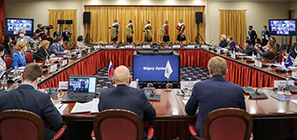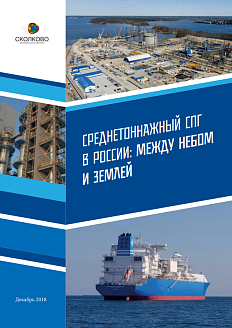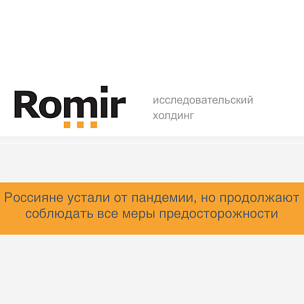Summary of the session «Prospects for the development of healthcare in the Arctic» as part of the Conference on Saving Human Health in the Arctic, held on June 1-3, 2022 in Arkhangelsk.
KEY CONCLUSIONS
The necessary conditions must be created in the Arctic regions for quality healthcare and the training of health personnel
«The way we have traditionally organized medical care for the inhabitants of this region is no longer sufficiently effective, which makes the development of a new healthcare model for the Arctic zone a priority,» Deputy Chairman of the Government of the Arkhangelsk Region Olesya Starzhinskaya.
«Vocational guidance is very important. For more than 25 years the university has been working on a system of continuous professional training. We now work from kindergarten right up to the creation of a young specialist, and then we continue to support young specialists. [...] It’s not just about preparing for university, it’s about ensuring that applicants who enter the university stay at the university and then stay in practical healthcare [in the Arctic regions],» Rector of the Northern State Medical University of the Ministry of Health of the Russian Federation Lyubov Gorbatova.
«It is extremely important for those living in rural areas, especially in areas with low population density, that we bring medical care closer to the patient, and one of the ways to improve access to medical care for the rural population in remote areas of the Arctic zone is to organize mobile teams,» Head Doctor of the Sakha Republic (Yakutia) Republican Public Health and Medical Prevention Centre Alyona Nikitina.
PROBLEMS
Low levels of digitalization, incomplete patient databases, and staff shortages
«Improving the system for collecting information on individuals’ health status and environmental factors in the Arctic zone, which is another object of statistical observation, is becoming more and more relevant,» Deputy Director for Research at the North-West Research Centre for Hygiene and Public Health of Rospotrebnadzor Roman Buzinov.
«Given the imposition of sanctions on the Russian Federation, several operators providing satellite telephone services have ceased operations in the Arctic areas. The available providers offer services at very inflated prices,» Head Doctor of the Sakha Republic (Yakutia) Republican Public Health and Medical Prevention Centre Alyona Nikitina.
«There is a problem with limits to how much information is available and the completeness of the data in electronic records. It’s something that needs to be worked on, the problem of incomplete coverage of medical organizations in the region by the regional segment of the unified health information system. And there is a problem related to registering patients leaving the region because of migration to another region, while in the information systems they are recorded as present and unreported,» Head of the International Centre of Scientific Competence at Northern State Medical University of the Ministry of Health of the Russian Federation Alexander Kudryavtsev.
«The drain of young professionals from the university, even those who want to do research work, is significant. Then there are problems with salaries. [...] We must see to it that training is more even, more complete. [...] Attention should be paid to the development of the university itself, because nowadays a lot has been done for young professionals who come to work in practical health care, a lot of incentives, a lot of benefits, and at the same time, young teachers and young researchers do not receive these incentives at all,» Rector of the Northern State Medical University of the Ministry of Health of the Russian Federation Lyubov Gorbatova.
SOLUTIONS
The creation of an Arctic Medical Centre of federal importance in Arkhangelsk and a consortium of organizations for the development of telemedicine in Russia
«The mission of the federal centre [Arctic Medical Centre of federal importance in Arkhangelsk] will be to develop and implement new health saving technologies in the harsh climatic and eco-hygienic conditions of the Arctic, study factors related to premature ageing, increased morbidity, and mortality among those living in the Arctic regions, train highly qualified medical personnel with an eye to the specifics of diseases and provision of medical care in the Arctic zone of the Russian Federation, ensure high living standards, including for small indigenous peoples, through the development of basic and applied science. [...] Telemedical technology is definitely the future, taking into account the low population density and logistical peculiarities in the constituent entities of the Arctic zone,» Deputy Chairman of the Government of the Arkhangelsk Region Olesya Starzhinskaya.
«We have created a telemedicine consortium, which looks forward to working together with the Arctic Medical Consortium (National Arctic Research and Education Consortium, — Ed. note) and will include all the leading developers and manufacturers of telemedical solutions and technologies, equipment and other things. [...] There are three problems to be solved here: ensuring accessibility, ensuring a high-quality standard, and just absolutely complete collection of information for all analytical decisions to be made by the federal scientific centre of Arctic medicine,» Chairman of the Board of Directors of the Scientific and Production Association National Telemedicine Agency and ATB Electronics Mikhail Natenzon.
«We need to advantage of joint efforts with other regions to make the direction taken in the training and science more effective,» Rector of the Northern State Medical University of the Ministry of Health of the Russian Federation Lyubov Gorbatova.
Introducing digital solutions in healthcare, creating a Sanitary and Epidemiological Well-being of the Population in the Arctic portal
«The most promising tools for assessing and analysing the sanitary and epidemiological well-being of the population include: automating data collection and analysis processes, introducing data analysis methods using geographic information systems (GIS) methodology, applying artificial intelligence to analyse large volumes of data on factors of public health and habitat. [...] In order to solve these problems in the context of the Russian Arctic, a task was set to create and develop a geo-information portal, the Sanitary and Epidemiological Well-being of the Population in the Russian Arctic portal. [...] The geoportal concept is based on a GIS geoinformation system, a database server, and an array of information on environmental factors, public health, and socio-economic and health and demographic indicators, using information and analytical tools and spatial data processing methods,» Deputy Director for Research at the North-West Research Centre for Hygiene and Public Health of Rospotrebnadzor Roman Buzinov.
«Rural health posts are unable to provide the 21 necessary population screening positions locally, while mobile complexes equipped with complete heavy medical equipment solve this task automatically and deliver the data to geoportals, to the federal scientific centre for Arctic medicine,» Chairman of the Board of Directors of the Scientific and Production Association National Telemedicine Agency and ATB Electronics Mikhail Natenzon.
«A unique patient identifier, such as the SNILS, should be introduced into Russian medical information systems. It would allow for accurate and efficient linking of data from different databases and registers,» Head of the International Centre of Scientific Competence at Northern State Medical University of the Ministry of Health of the Russian Federation Alexander Kudryavtsev.
For more analytical materials on the Arctic agenda, see the Roscongress Information and Analytical System roscongress.org/en/knowledge/arktika/materials/.
The material was prepared by the information partner of TASS.






